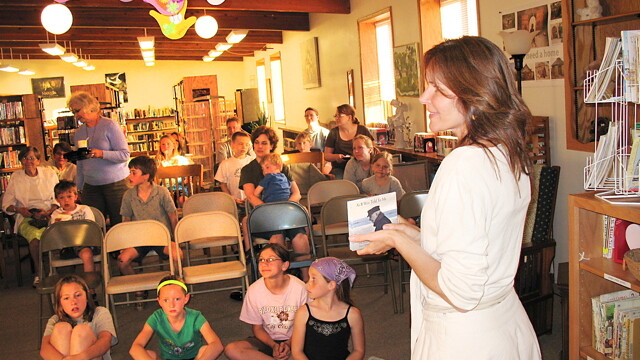Meet the Storyteller
Tracy Chipman tours the state telling stories

When Tracy Chipman was teaching preschool in Eugene, Oregon in 1995, she – as I’d imagine most preschool teachers do – told her class stories.
“Obviously I read books to them, but there were some really powerful experiences that occurred when I’d be telling the story without a book, without pictures,” Chipman said. “And we’re talking three and four and five year-olds, and they just totally got into it.”
This storytelling, not to be confused with story reading, soon became a full-blown career, and passion, for Chipman, who now lives in Menomonie.
“I loved how story has the power to affect people and change their lives,” she said. “I don’t really have a tradition of storytelling in my own life or in my family, but I just thought it sounded like a wonderful thing.”
Now Chipman tells stories at libraries, festivals, and other events around the country, engaging audiences young and old.
This isn’t a career Chipman just jumped into. To learn more, she set out to do field research on storytelling, spending her summers in Scotland. There she spent her nights as a barmaid and her days traveling to villages and towns to talk with elders and tradition bearers and, most importantly, hear their stories.
Besides learning the tales themselves, Chipman said she also learned about the art of storytelling, whether these traditional Gaelic stories or our own.
“What I’m doing is something that anyone can do. It’s not like the guitar where you have to learn. It’s really important to know that they are a storyteller and if they start paying attention to that side of themselves, powerful things can happen.” – Tracy Chipman on storytelling
“Not only did I collect and gather these stories, but they became my teachers. And I didn’t really realize this until many, many years later,” Chipman said. “I really didn’t know much about storytelling until I went and did this field work, but I learned about how to paint a picture, how to open a door so that your listener can really step into that door.”
Chipman said she also learned how to be a good listener and how important that is to storytelling.
Now, Chipman is applying these lessons in her own storytelling, which she is now traveling around Wisconsin to share. She hopes audiences can walk away with an appreciation of the art of storytelling and realize that we’re all storytellers in our own right and each person has their own voice.
“What I’m doing is something that anyone can do. It’s not like the guitar where you have to learn. It’s really important to know that they are a storyteller and if they start paying attention to that side of themselves, powerful things can happen.”




















